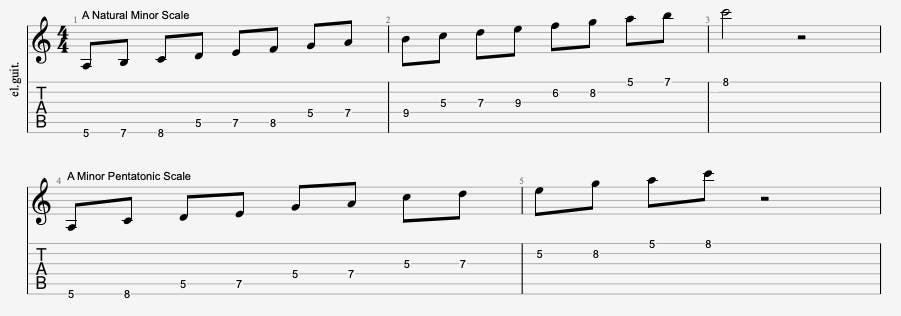
The Secret Of Great Pentatonic Guitar Soloing!
It falls under our fingers so readily and is the corner stone of so many great guitar solos and riffs. But that 2 note per string staple of rock guitar soloing can sound stale if every lick comes from the same pattern. The solution is easier than you may think and you don’t even have to learn any new scales … Welcome to the world of pentatonic substitutions!
1. Change things up in an instant
So, the term ‘pentatonic substitution’ is immediately loaded with advanced fusion guitar nerdy connotations. Relax, this one is a theory free zone and will lift your rock guitar improvisation game faster than the time it takes to say ‘This sounds tricky, I’m outta here’.
Try this - grab a rock backing track in the good honest key of A minor (nothing jazzy/dorian - for reasons we will discuss in a mo). An easy ballad will do. (note from editor - check out the links at the bottom of the page for some choice tracks)
So - Key of Am equals your A minor pentatonic scale, right? Makes sense and is an obvious choice. Instead of A pentatonic, hit your D minor pentatonic scale instead (fret 10, for ease if you like).
You hear that? All your stock pentatonic guitar licks are still there but take on a whole new sound when played using D minor over this A minor backing track.
Our brains tell us this shouldn’t work but our ears says yes! What’s going on? Glad you asked!
2. What’s that all about then?
The reason our A minor pentatonic so readily fits over a song in the key of A natural minor is that it takes all the ‘safe’ notes from the 7 note minor scale. Take a look:

Now check out D minor in the same position. All of those notes are also part of the A minor scale.


The beauty of it is, by playing our D minor pentatonic licks we are hitting the less obvious notes which can make things sound a bit pedestrian after a while.
You can do this with any minor scale, which starts on the E string, by playing the pentatonic scale found on the A string in the same fret:
A minor - use Dm, G minor - use C minor, B minor - use E minor.
You get the idea.
3. I like this .. Gimme more!
You betcha! Get that backing A minor track back to the start and try your E minor pentatonic licks (avoid those blues scale notes though - tempting as it might be!).
Another dose of ear candy, right? You can merrily play your favourite Em pentatonic lines and patterns, but they become a whole new animal when played over your A minor backing track.
For our purposes, here’s E minor pentatonic in the 5 position (so you don’t have to shift frets) compared to our A minor scale:

Yep, you guessed it, those E minor notes are all found in our A minor scale too. Magic!
4. Mix it up!
Now you’re on board with this; here is a cool idea which also works wonders for playing great, well phrased guitar solos!
Play a short lick from one of our 3 pentatonic scales, then answer it with a phrase from another. Repeat this in that true, time honoured fashion of blues guitar ‘question & answer’ style. Now we’re cooking and your tired pentatonic licks are all dressed up and sounding fancy.
5. What’s next?
As I eluded to earlier in the blog, the above approach works great when playing in regular, everyday A minor. Things change, however, when you bring in the modes. An A minor backing track/song which is actually A dorian, for example is not going play well with D minor pentatonic - give it a try and get ready for some eye watering results!
Try laying down B minor pentatonic over your A dorian track - jazzy euphoria ensues! This is for same simple reason - we are hitting some great notes from the mode ‘by mistake’ when playing this pentatonic scale.
You may have already guessed it, but we can create the sound of different modes and even our complex jazz scales, such as the altered scale, using our common garden pentatonic. There are plenty of further tricks to undercover with this!
The pentatonic is far from the our perception of it as a beginner’s, baby’s first guitar scale!
A soloing secret? Perhaps not; players have being using this trick for years. If this was indeed a trade secret, it is now out of the bag and all yours to use to transform your guitar solos with …. Enjoy!